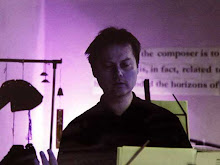Here's a review of Klaus Kinski's "ALL I NEED IS LOVE", that Gary Indiana (real name, Gary Hoisington) wrote in 1990. It's taken from his highly readable collection of essays and reviews "LET IT BLEED. ESSAYS 1985-1995), published by Serpent's Tail/High Risk Books, London and New York, in 1996. This anthology collects samples of his work for "Art in America", the "Village Voice" and "Artforum". Great stuff. Check it out!
"Going out of print is only the last in a long series of humiliations inflicted on most writers by most publisheing houses. Unless you are the most wildly popular public strumpet, or have written some vapid book about one, chances are your publisher - who, after all, is running a whorehouse, not a publich charity - believes he is doing you a huge favor to begin with. Of the thousands of writers he could pluck from obscurity, it's you whom he's decided to favor.
Naturally, it would be base ingratitude for you to expect anything more than chump change in return for one, two, three, sometimes four or five years of work. You think your publisher doesn't have an overhead? Who do you think you are, Belva Plain? Ads? Are crazy, ads? Why should he do anything for you? It's no surprise that dozens of good books go out of print every year, when their publishers manifest no real support for them in the first place. I know one writer whose five novels are widely regarded as ground-breaking, fascinating works; they're all out print. I know another whose two novels are universally considered plodding, mechanical, unreadable exercises in intellectual vanity; because of her enduring fame as a writer of jacket quotes and slender, precious meditations on contemporary aesthetics, her publisher has dutifully reissued the novels every few years for the past 20.
Arbitrary as it really is, authors naturally experience going out of print as a horrific form of judgement. Klaus Kinski, however, need feel no such qualm.
All I need is love would certainlyhave given Belva Plain a run for her money, but Random House stopped shipping after 10 thousand copies, reportedly out of fear of libel suits. Kinski collected a hefty advance and, if his book's self-portrait is anything to go by, couldn't care less whether anybody gets to read it. It is an astonishing document that makes Errol Flynn's
My Wicked, Wicked Ways and Hedy Lamarr's
Ecstasy and Me look exceedingly like
Rebecca of Sunnybrook Farm.
Kinski grew up in hideous poverty. At age 16, at the desperate end of World War II, he was forced into army service and then became a prisoner of war. His account of childhood has a blunt descriptive brilliance. After a meal in achildren's welfare home:
"I barf right into my torturer's mug. Ithrow up everything in my stomach. Filthy shit comes shooting out of my wide-open throat in spurts like a sewage pump until I'm emptied to my very bowels and can't pump anything more. Doubled over by cramps, I rush from the table, as the jail-warden slut nearly chokes to death on my barf and bawls me out at the top of her lungs."
His adventures in the army are equally salient. Right after the war, Kinski starts his career as a stage actor. Everyone, including Bertolt Brecht, senses his genius. But that's not important to him. What he cares about, what consumes him, is getting laid. Starting at age 14, Kinski fucks virtually every female who crosses his path, in doorways, dressing rooms, public parks and toilets. His triumphs on the stages of Germany and Austria are mere background noise in the din of grunting, snuffling sex.
"I haven't called Biggi even once from Prague. When she calls me, I lie and say that I'm shooting day and night. I am a pig. But I am rendered powerless by Dominique who has enslaved me with her cunt. Dominique is obsessed with me, too; she asks me to stay with her, live with her. I promise I will."
Like Henry Miller, Kinski is irresistably attractive to everyone around him. Men and women both go crazy for his cock, though he has evidently avoided homosexual penetration. And while he's surrounded, like Miller, by a chorus of arty gargoyles proclaiming his genius, Kinski himself has nothing but loathing for his career. The money passage of this bookdescribes the director whose films made Kinski an international star:
"It's perfectly clear to me that never in my entire life have I encountered such a humorless, mendacious, stubborn, narrow-minded, pretentious, unscrupulous, bumptious, spiritless, depressing, boring, and sickening person - entirely unconcerned, he drives home the most uninteresting high points, finally falling to his knees like a sectarian, holding forth fanatically, waiting for someone to pull him up. Having unburdened himself of his garbage stinking all over the place and making me want to vomit, he pretends to be a naive child of innocence, talking about his dreamy poetic existence, as if he weren't living in reality at all and doesn't have the vaguest idea of the brutal material side of the world."
All Kinski needs is love, but the love he needs can only be had with a great deal of money. Offered a choice between "quality" films and high-paying trash, Kinski opts for trash almost every time. This buys him villas and Rolls-Royces and epic weekend flights from cooze to cooze. His mania is aggravated by marriages, the birth of children, and ever-burgeoning fame.
It isn't so much the belated Beat Era anarchy, or Kinski's quirky compassion for animals and children, or the scads of amusing pornography that give this book its great charm. What distiguishes
All I Need Is Love from other out-of-control, cunt-crazy, tell-all memoirs (cf. Miller, Bukowski,
I Jan Cremer) is its operatic self-contempt, so blaringly sustained that it aquires a sacramental aura. Unlike the wild and crazy guys who pioneered this genre, Kinski knows that his "genius" doesn't redeem a single moment of his piggishness, and beause he wallows in it on its own terms Kinski invests it with quixotic integrity."
(from: "Let It Bleed, Essays 1985-1995", by Gary Indiana, 1996, pp. 219-221.)
Gary Indiana is a US playwright, novelist and journalist. A biography with bibliography is available under following link:
Gary_Indiana - Wikipedia Bio








